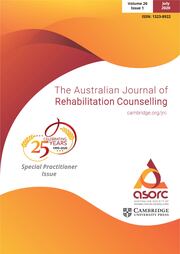Article contents
The Role of Pet Ownership and Attachment in Older Adults
Published online by Cambridge University Press: 15 October 2015
Abstract
Australia is preparing for a population increase in persons aged over 65 years, which will likely result in increased mental health needs for this group. Sub-clinical levels of depression, anxiety and loneliness are common in older adults. Older adults are also more likely than any other age group to live alone. Research has suggested that older adults living on their own often report companion animals as providing important social support. Thirty-two community-dwelling older adults, between 60 and 75+ years of age, took part in this study examining attachment to pets in an older cohort. Previous or current pet ownership was a requirement for inclusion in the study in order to account for possible bias of nonpet owners on reporting pets as a positive influence on wellbeing. Results found support for the psychometric properties of a relatively new attachment scale designed for older adults. Results also indicated limited support for a relationship between pet attachment and quality of life in the study group. Implications for clinical work with older adults and areas for future research are discussed.
- Type
- Articles
- Information
- The Australian Journal of Rehabilitation Counselling , Volume 13 , Issue 1 , 01 January 2007 , pp. 32 - 43
- Copyright
- Copyright © Cambridge University Press 2007
- 5
- Cited by


